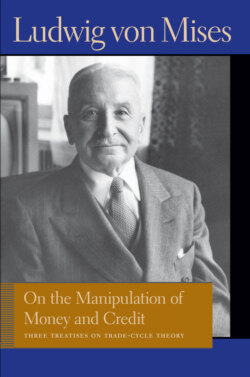Читать книгу On the Manipulation of Money and Credit - Людвиг фон Мизес - Страница 16
На сайте Литреса книга снята с продажи.
7. Greater Importance of Money to a Modern Economy
ОглавлениеOf course, one must be careful not to draw a parallel between the effects of the catastrophe, toward which our money is racing headlong on a collision course, with the consequences of the two events described above. In 1781, the United States was a predominantly agricultural country. In 1796, France was also at a much lower stage in the economic development of the division of labor and use of money and, thus, in cash and credit transactions. In an industrial country, such as Germany, the consequences of a monetary collapse must be entirely different from those in lands where a large part of the population remains submerged in primitive economic conditions.
Things will necessarily be much worse if the breakdown of the paper money does not take place step by step, but comes, as now seems likely, all of a sudden in panic. The supplies within the country of gold and silver money and of foreign notes are insignificant. The practice, pursued so eagerly during the war, of concentrating domestic stocks of gold in the central banks and the restrictions, for many years placed on trade in foreign moneys, have operated so that the total supplies of hoarded good money have long been insufficient to permit a smooth development of monetary circulation during the early days and weeks after the collapse of the paper note standard. Some time must elapse before the amount of foreign money needed in domestic trade is obtained by the sale of stocks and commodities, by raising credit, and by withdrawing balances from abroad. In the meantime, people will have to make out with various kinds of emergency money tokens.
Precisely at the moment when all savers and pensioners are most severely affected by the complete depreciation of the notes, and when the government’s entire financial and economic policy must undergo a radical transformation, as a result of being denied access to the printing press, technical difficulties will emerge in conducting trade and making payments. It will become immediately obvious that these difficulties must seriously aggravate the unrest of the people. Still, there is no point in describing the specific details of such a catastrophe. They should only be referred to in order to show that inflation is not a policy that can be carried on forever. The printing presses must be shut down in time, because a dreadful catastrophe awaits if their operations go on to the end. No one can say how far we still are from such a finish.
It is immaterial whether the continuation of inflation is considered desirable or merely not harmful. It is immaterial whether inflation is looked on as an evil, although perhaps a lesser evil in view of other possibilities. Inflation can be pursued only so long as the public still does not believe it will continue. Once the people generally realize that the inflation will be continued on and on and that the value of the monetary unit will decline more and more, then the fate of the money is sealed. Only the belief, that the inflation will come to a stop, maintains the value of the notes.
